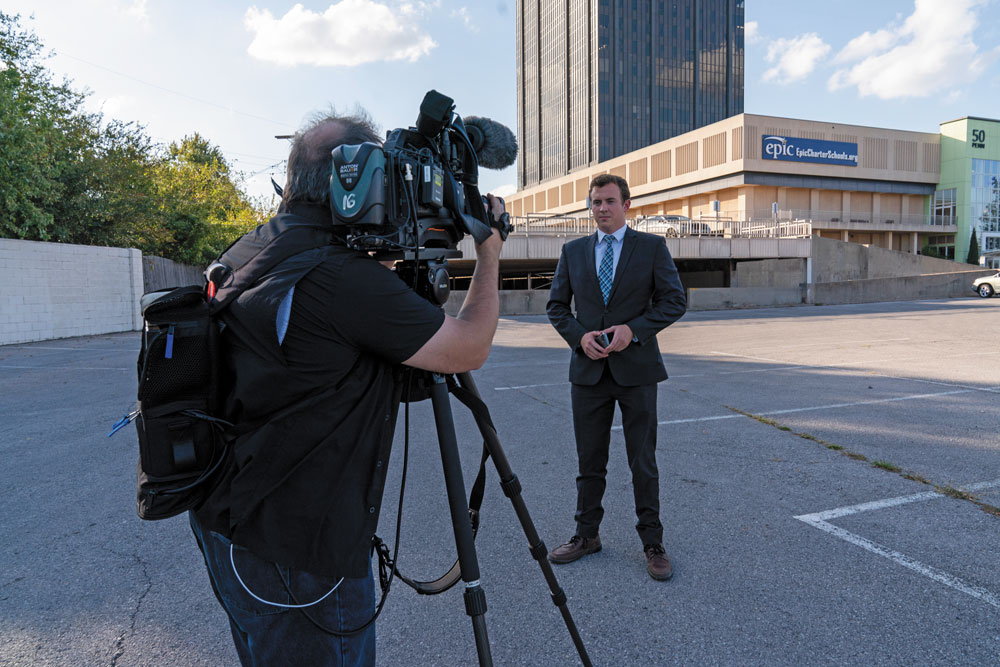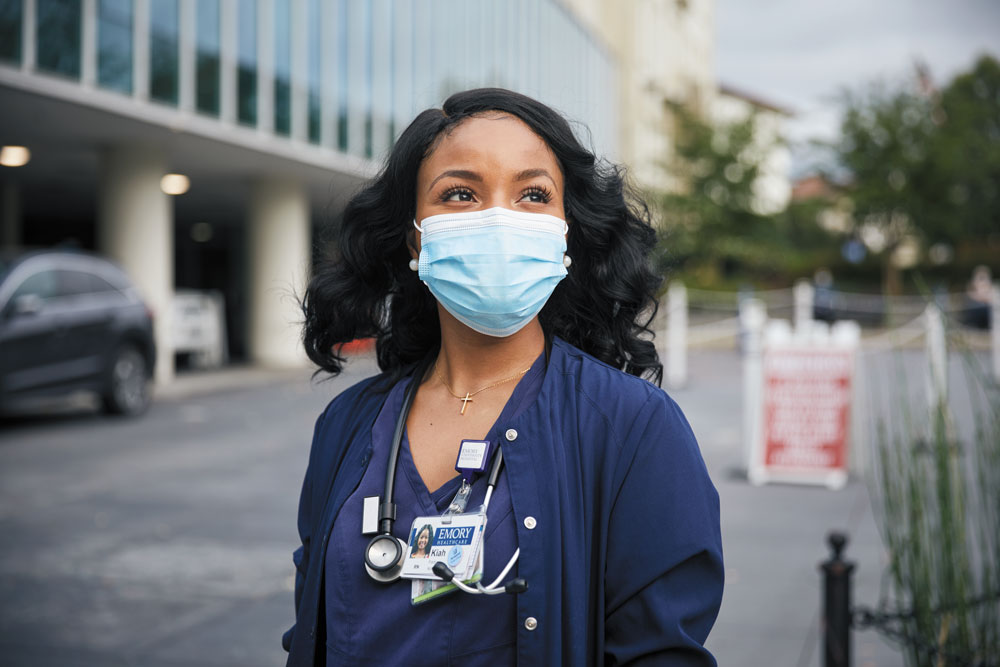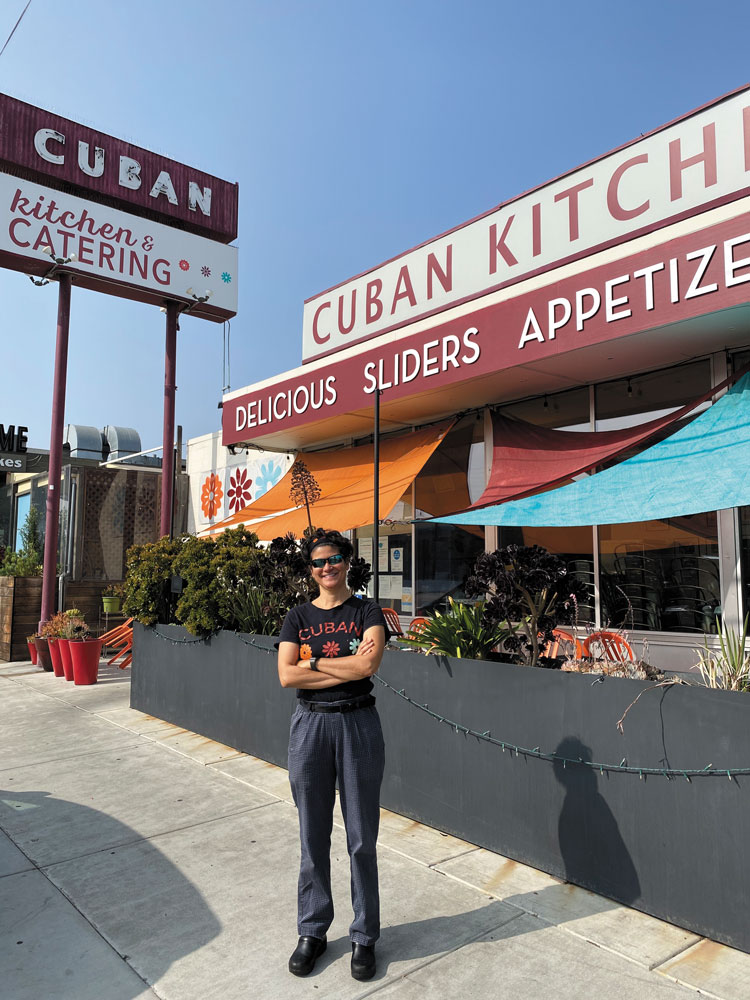Alumni confront Covid close-up
The COVID-19 pandemic upended the working world, emptying out office buildings and downtowns. Many people began working remotely—or faced furloughs or layoffs. But for essential and front-line workers, including UVA alumni such as the dozen featured here, there was no chance to quarantine. Here are their stories.
Afolake Wilson (Col ’06, Educ ’10)
Second-grade teacher
The first sign that something was different at Peabody School in Charlottesville was the annual game night in March. Afolake Wilson (Col ’06, Educ ’10), a second-grade teacher, noticed the popular event wasn’t as well-attended as usual. “Then things rapidly happened,” she said.
Like other schools, it opted for virtual learning only. But the goal was always to return to the classroom when they could. That happened in August.
Wilson now leads a class of 11 second graders. Instead of sharing tables, they have individual desks with plastic dividers. Everybody wears masks. Tents allow for outdoor classrooms. They play games to practice how to stand 6 feet from each other. She’s feeling “OK,” she said, about the return to the classroom.
“As I tell my kids, we’re a family,” she said. “And part of being a family is that we trust each other. I’m going to trust you to keep me safe, and you’re going to trust me to keep you safe. And they really understand that.”
Adriana Allen (Col ’20)
Grocery worker, graduate student
After the pandemic canceled her summer plans at Johns Hopkins University, Adriana Allen (Col ’20) was looking for something to do. In April, she took a job at a grocery store in her hometown of Newport News, Virginia. Early on, she was nervous that she might pick up the coronavirus, but her mother, who works in a bank, was working outside the home too.
At the register, as she answered endless questions about hard-to-find items like toilet paper, she also grew more confident in the store’s safety measures. She wears a mask. She washes her hands regularly during shifts. Barriers separate her from customers.
Until this year, Allen, who also is pursuing a master’s degree in public health from UVA, didn’t really recognize grocery workers as “essential.” She has a different view now. When she drives by signs that say, “Superheroes Work Here,” she wonders if people include grocery workers, who work despite the risks, in their definition of superheroes. “It definitely set in,” Allen said, “that I kind of qualified as that too.”
Barry Mangold (Col ’17)
TV journalist

As the nation stayed home, Barry Mangold (Col ’17) picked up and moved in April from one local TV job in Missouri to a new one in Oklahoma. Since then, as a multimedia journalist and fill-in anchor for News 9 in Oklahoma City, Mangold’s task has been to get to know a new community in quarantine. “It’s been weird adjusting to it,” Mangold said.
Mangold has driven across the region for stories and done plenty of reporting on the street. COVID-19 is the familiar thread that runs through most. But in early June, the station’s attention turned to another topic—protests against police brutality. Mangold covered the peaceful rally that turned chaotic in Oklahoma City, getting tear-gassed while on air.
“I’ve been in Oklahoma City for five months now, but it feels like I’ve been here for years,” he said. “I haven’t shaken a lot of hands, but I have met a lot of people. And that’s the job.”
Britney Pulliam (Col ’12)
Dentist
As a dentist in Atlanta, Britney Pulliam (Col ’12) works in a place we’re all trying to avoid—other people’s mouths. “At first, it was scary,” she said.
In the spring, her office closed for two weeks before reopening to see only patients with immediate needs, working to keep people with severe dental issues out of emergency rooms so doctors could focus on COVID patients. Business remained slow, however, even when regular cleanings resumed. Pulliam was laid off in late July but picked up a new job within weeks.
Today, she’s not so scared anymore. She dons layers of protection—two different masks and a face shield. Her office also has instituted other procedures, including regular COVID tests. She misses socializing with family and friends, who she’s mostly stayed away from because of her work. But the job is rewarding.
“It makes you really feel like you’re accomplishing something, and you are making a difference,” she said.
Kiah Ford (Col ’14)
Registered nurse

Six months into the pandemic, Kiah Ford (Col ’14) was still quarantining and staying away from friends. Her job as a nurse at Emory University Hospital in Atlanta puts her in contact with the coronavirus. But she also feels confident that the elaborate process to put on and take off her personal protective equipment is effective.
“I know that with my work, I’m at risk,” she said, “even though I feel like I have so much more hygiene than the average person because of how strict we are in the hospitals right now.”
Usually assigned to the transplant unit, Ford moved to different floors across the hospital, including those caring for COVID patients, as the pandemic threw her work assignments up in the air and Emory scaled back on surgeries. It’s been stressful. Therapy and meditation have helped ease
her mind.
“This isn’t how we live life, but this is our reality for the time being,” said Ford, who misses exploring Atlanta with friends. “It really did serve as a catalyst for me to do a lot of self-work.”
Ellen Dietrick (Col ’00, Educ ’00)
Preschool director
In March, like other schools across the country, the preschool at Temple Beth Shalom in Needham, Massachusetts, shut down. Ellen Dietrick (Col, Educ ’00), director of early childhood learning, kept working, guiding virtual learning and preparing the building for when students could return. “We framed it as: We never would have wanted this to happen, but it’s here, and instead of going back to old ways, what’s the new way?” she said. “How can we be creative and innovative?”
In late June, the preschool reopened for summer programs with new outdoor classrooms and play areas in the parking lot and new rules, including masks for everybody age 2 and up. School started in early September. The response, Dietrick said, has been one of thanks.
“On the first day, I got an email from a parent that said their child had gone home and said, ‘That was the best day of my whole life,’” Dietrick said. “Kids are really resilient. They were fine at home. But when they got to experience [school] again, it was just that happiness and joy.”
Kiyoko Timmons (Col ’13)
Art therapist
At the Richmond, Virginia, psychiatric hospital where Kiyoko Timmons (Col ’13) works as an art therapist, she’s seen the mental health toll of COVID-19. Adults are relapsing because of the stress of pandemic-related job losses. Teens are isolated and depressed because of school closures.
Timmons provides them with art supplies and various prompts to encourage self-reflection. “It’s really interesting just seeing people that might be initially resistant create something so deeply personal,” Timmons said.
These days, Timmons’ work routine includes wearing a mask and carefully sanitizing her art supplies. Patients are tested for COVID before arrival, but, worried about potential exposures, she’s also limited contact with her extended family. When she feels troubled, she falls back on her art—journaling, sketching and painting with watercolors.
“I try really hard not to get discouraged and feel hopeless about what’s going on,” she said. “I lean a lot on just being grateful for what I still have … and just making time for myself. That’s one of the silver linings.”
Lauren Carter (Col ’13)
Family medicine resident
The pandemic hit in March, and life changed almost immediately for Dr. Lauren Carter (Col ’13), the chief resident at ChristianaCare’s Family Medicine Residency program in Delaware. The hospital quickly ramped up its virtual care offerings. Carter took a crash course in how to provide telehealth services to patients.
“In medical school or anywhere, you’re not quite taught how to do a physical exam when you can’t touch somebody,” she said. “It was a learning curve, but it’s been really, really instrumental.”
Suited up in masks, gloves and other PPE, Carter is still seeing patients in person too, her own and others, including those with COVID, as she moves across different hospital departments.
“One of the hardest parts was right after the initial stage when everyone was, ‘OK, once the pandemic is over, once quarantine is over,’ and then realizing that this might not be over,” she said. “This is an ongoing marathon we’re in right now.”
Matt Dziama (Col ’19)
Urgent care medical assistant
As the pandemic ramped up, Matt Dziama (Col ’19) was starting his job as an urgent care medical assistant for Harvard Vanguard Medical Associates in Massachusetts. In his first week, he was wearing two masks and a face shield to protect against transmission. The job required him to take patients’ vitals and administer COVID tests. “It was both exciting and a little nerve-wracking at first,” he said.
Part of UVA’s 2019 NCAA championship lacrosse team, Dziama is now an aspiring physician’s assistant and was living at home, preparing to apply to graduate school. Through June, he quarantined in his parents’ basement, worried that he might pass the coronavirus to them. He mostly saw them when he got his meals at the top of
the stairs.
By mid-July, COVID cases were declining, and Dziama started seeing people with broken bones or needing stitches. “It’s been nice to see more regular urgent care patients because for so long I was only treating either COVID or potential COVID patients,” he said. “It was sort of like learning a whole other thing.”
Skye Scott (Col ’20)
Bank teller, college adviser
The pandemic didn’t close the Charlottesville Wells Fargo where Skye Scott (Col ’20) worked as a bank teller, but it shut the doors to the physical building except for customers with appointments. Scott’s job went from just helping people with their money to also directing traffic as cars lined up outside for the drive-through.
“We had to play this role of managing the cars and of comforting customers who were very worried about their money and about what was going to happen if the banks closed,” said Scott, who said she was “fairly comfortable” helping customers if they wore a mask.
The job was always intended to be a temporary one, and after two years, she left in June to become a college adviser at Buckingham County High School to help students plan their futures. The school opened for online learning only in August.
“I’m very excited to be able to see them in person,” she said. “But it does come with that added exposure and risk, and that makes me nervous.”
Tanya Cauthen (Engr ’91)
Owner, Belmont Butchery
It was March 19, a Thursday night. Tanya Cauthen (Engr ’91) went home at 6 p.m., leaving her Richmond shop, Belmont Butchery, in her employees’ hands. “We seemed busy, but not anything I needed to stay for,” she said.
The next morning, Cauthen pulled up the sales figures and was shocked. The night before, customers had loaded up on chicken breasts and ground beef, stocking up as the world shut down. Sales were 50 percent higher than usual. “I scrambled and basically made a bunch of phone calls, and I physically ran around to farms and to meet people and get more product for the weekend,” she said.
It’s been a scramble ever since. Cauthen closed the store to shopping for some time, began offering curbside pickup, adjusted employees’ duties based on their health considerations and navigated a new business landscape to ensure she had the high-quality beef, pork and poultry that her customers expect.
“For the most part, I’m hopeful,” Cauthen said. “Our core clientele has been incredibly respectful and incredibly supportive.”
Lynna Martinez (Darden ’94)
Owner, Cuban Kitchen

The pandemic’s impact was immediate for Lynna Martinez (Darden ’94) and her restaurant, Cuban Kitchen, in San Mateo, California. The business relied on corporate catering orders, and those dried up as offices closed. Sales dropped by half in April.
Martinez began pushing her website, which she had luckily upgraded in late 2019 to allow online ordering, and secured a federal loan. She also began looking for ways to diversify her business, such as bottling her sauces and juices. “It’s unnerving because I feel responsible for the livelihood of nine people, including my daughter,” she said of her employees.
But it’s not all been stressful. Her customers rallied around her, praising her on Yelp like never before and raising $3,000 on GoFundMe. The money went to the restaurant’s employees and to serve front-line workers.
“I get a little emotional,” she said through tears, “because even if I lose everything, it was such a great experience to see that side of humanity and support for something that we’re doing with great love.”
